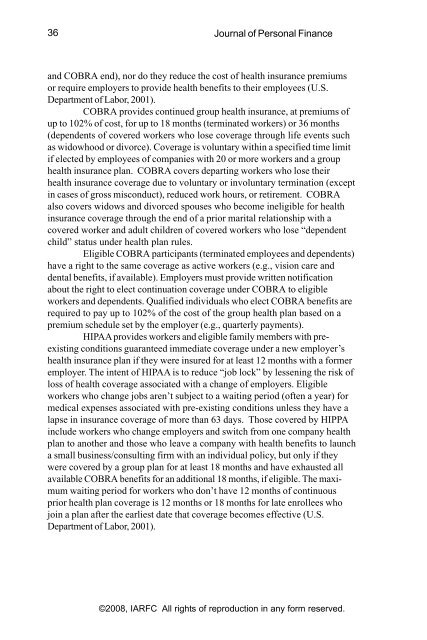3433-vol. 6 issue 2-3.pmd - iarfc
3433-vol. 6 issue 2-3.pmd - iarfc
3433-vol. 6 issue 2-3.pmd - iarfc
You also want an ePaper? Increase the reach of your titles
YUMPU automatically turns print PDFs into web optimized ePapers that Google loves.
36<br />
Journal of Personal Finance<br />
and COBRA end), nor do they reduce the cost of health insurance premiums<br />
or require employers to provide health benefits to their employees (U.S.<br />
Department of Labor, 2001).<br />
COBRA provides continued group health insurance, at premiums of<br />
up to 102% of cost, for up to 18 months (terminated workers) or 36 months<br />
(dependents of covered workers who lose coverage through life events such<br />
as widowhood or divorce). Coverage is <strong>vol</strong>untary within a specified time limit<br />
if elected by employees of companies with 20 or more workers and a group<br />
health insurance plan. COBRA covers departing workers who lose their<br />
health insurance coverage due to <strong>vol</strong>untary or in<strong>vol</strong>untary termination (except<br />
in cases of gross misconduct), reduced work hours, or retirement. COBRA<br />
also covers widows and divorced spouses who become ineligible for health<br />
insurance coverage through the end of a prior marital relationship with a<br />
covered worker and adult children of covered workers who lose “dependent<br />
child” status under health plan rules.<br />
Eligible COBRA participants (terminated employees and dependents)<br />
have a right to the same coverage as active workers (e.g., vision care and<br />
dental benefits, if available). Employers must provide written notification<br />
about the right to elect continuation coverage under COBRA to eligible<br />
workers and dependents. Qualified individuals who elect COBRA benefits are<br />
required to pay up to 102% of the cost of the group health plan based on a<br />
premium schedule set by the employer (e.g., quarterly payments).<br />
HIPAA provides workers and eligible family members with preexisting<br />
conditions guaranteed immediate coverage under a new employer’s<br />
health insurance plan if they were insured for at least 12 months with a former<br />
employer. The intent of HIPAA is to reduce “job lock” by lessening the risk of<br />
loss of health coverage associated with a change of employers. Eligible<br />
workers who change jobs aren’t subject to a waiting period (often a year) for<br />
medical expenses associated with pre-existing conditions unless they have a<br />
lapse in insurance coverage of more than 63 days. Those covered by HIPPA<br />
include workers who change employers and switch from one company health<br />
plan to another and those who leave a company with health benefits to launch<br />
a small business/consulting firm with an individual policy, but only if they<br />
were covered by a group plan for at least 18 months and have exhausted all<br />
available COBRA benefits for an additional 18 months, if eligible. The maximum<br />
waiting period for workers who don’t have 12 months of continuous<br />
prior health plan coverage is 12 months or 18 months for late enrollees who<br />
join a plan after the earliest date that coverage becomes effective (U.S.<br />
Department of Labor, 2001).<br />
©2008, IARFC All rights of reproduction in any form reserved.
















